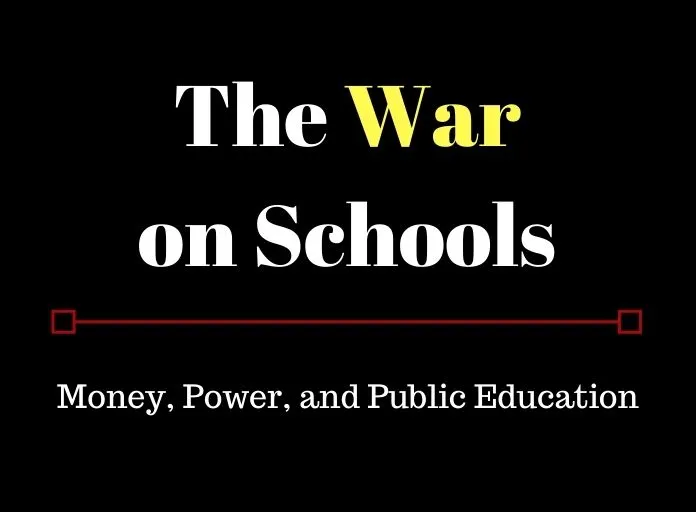Public schools are at the heart of our communities, yet powerful interests have led a decades-long national effort to undermine them. Their strategy is morphing, but the ultimate goal remains the same: replace the grand American tradition of “common schools” with private education.
The corporate lobbyists and free-market ideologues working to dismantle public education have many motivations.
Teachers’ unions are a powerful voice, and breaking them is part of a broader effort to weaken worker power. Public schools are the biggest item in state budgets, so defunding them makes room for tax cuts that benefit the wealthy and corporations. And there’s money to be made by for-profit privatizers offering computer-based schools staffed with low wage proctors rather than well-trained and adequately paid teachers.
For these proponents, moving away from public schools is also about narrowing the purpose of education to that of creating a compliant workforce. Without strong public schools, we have a weaker democracy with fewer knowledgeable and engaged citizens that can question authority. And a workforce-only focus could even funnel kids more quickly into low-wage jobs, a corporate goal revealed by recent policy changes that are rolling back child labor laws in 11 states.
But the original, head-on approach of replacing public schools with private school vouchers has been unpopular, forcing proponents to modify their strategies. One approach was the halfway measure of charter schools, which once had bipartisan support but have now lost that luster. Another is private school tax credits enacted across the country. Some states are now dramatically expanding these credits into full voucher programs.
In Kentucky, a pilot voucher program passed the legislature in 2021. But in December a unanimous state Supreme Court threw the law out, ruling that the state Constitution requires public money go to public schools unless approved by a vote of the people.
There’s a second prong to the strategy: slowly cut funding for public schools to make them less effective and thereby fuel calls for privatization. Since it’s politically hard to do that directly, proponents begin with tax cuts that then result in less money for the budget, a process that started decades ago in Kentucky.
The next step is to “never let a serious crisis go to waste.” The Great Recession and the weak subsequent recovery hammered tax receipts, and states like Kentucky claimed they had no choice but to cut school funding for more than a decade. That’s also when Governor Matt Bevin went on the attack against teacher pensions, though the backlash from his abrasive approach caused him to lose his bid for re-election and put a temporary halt to the strategy.
However, the COVID-19 crisis is allowing the process to restart. Congress passed strong economic stimulus legislation that helped the economy soar, while the pandemic hampered supply chains, spurring inflation. Those factors created large but temporary budget surpluses, which Kentucky is using not to reinvest in schools but as an excuse to permanently and deeply cut the revenue source for nearly half of the state budget, the individual income tax. That will force inevitable cuts to public services down the road.
COVID also plays a role in a culture war in which fighting “woke” schools is the newest element of the anti-public education strategy. Frustration over school closures mutated into manufactured moral panics ranging from alleged “critical race theory” in school curriculum to attacks on support for LGBTQ+ students.
Which brings up the other flank of the coalition for school privatization: those backing a cultural ideology tinged with religious nationalism and race and gender hierarchy. There’s a long history here as well, with “school choice” efforts rooted in attempts to maintain racial segregation after Brown v. Board of Education. That part of the coalition has a somewhat energized base, though its mean-spirited positions are sparking an organized backlash.
Whether the coalition of market and cultural fundamentalists is big enough to continue the move away from public schools is yet to be seen. A trial may be coming soon in Kentucky, as some say they'll push next session to put a school choice constitutional amendment on the ballot. And at some point the economy will stumble, weakening tax revenues and eventually forcing difficult public school funding decisions due to a lower income tax.
This emerging debate is one of the toughest tests this commonwealth has ever faced. The outcome depends on how many people understand the stakes, and join the fight.
--30--
Written by Jason Bailey, executive director of the Kentucky Center for Economic Policy.







